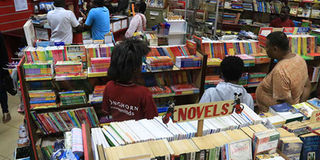Disappearing bookshops is cultural decay

KDS bookshop in Nyeri. The displacement of bookshops by the gadgetry of modern life means the reading for fun, for knowledge, and for heuristic purposes, is dying. PHOTO | FILE | NATION MEDIA GROUP
What you need to know:
- A bookshop in a town, or a library in a school or a community, is a repository of the finest inheritance of any generation.
- But the temples of modern virtual civilisations — mobile phones and the like — are displacing some of the most treasured bookshops in Nairobi and other towns in the country.
What I say is, a town isn’t a town without a bookstore. It may call itself a town, but unless it’s got a bookstore, it knows it’s not foolin’ a soul,” wrote Neil Gaiman, in American Gods.
The temples of modern virtual civilisations — mobile phones, airtime, gadgetry and the like — are displacing some of the most treasured bookshops in Nairobi and other towns in the country.
A bookshop in a town, or a library in a school or a community, is a repository of the finest inheritance of any generation.
A town or a community suffers irreparable lose if they are replaced with something else — however beneficent to the community.
BookPoint is gone. The bookshop under Stanley Hotel is gone. So have others on Koinange Street and Moi Avenue.
The iconic Mt Kenya Bookshop in Kakamega Town disappeared many years ago. That was the first bookshop I walked into while in Form One.
KNOWLEDGE
I would buy a fiction novel every term throughout my six years of secondary and high school.
It is here that I bought Across the Bridge by Mwangi Gicheru in 1980, A Girl Cannot go On Laughing All the Time by Magaga Alot, Gulliver’s Travels by Jonathan Swift and Darkness at Noon by Arthur Koestler. I trace my knowledge of the world of books to this bookshop.
Nairobi was once awash with bookshops that sold books of high cultural value in terms of knowledge, thought and refinement in writing. All are gone.
We cannot talk of Kenya joining and managing the complexities of knowledge economy when we don’t buy and read books of outstanding intellectual, professional and technical rigour.
I had the privilege — in my six-week stint in India — to walk into Indian Institute of Technology, Bombay in 2009.
I had been advised to try the institute’s bookshop, from where I would find Jawaharlal Nehru’s An Autobiography.
HUMANITIES
I did not only find the book but I did two great classics — The Panchatantra, an ancient Indian collection of fables, and Friedrich Froebel’s The Education of Man, a classic on education theory.
I found it odd that an institute founded on science, technology, engineering and mathematics (Stem) had books on the humanities and the social sciences — when here, we look down upon the arts and humanities.
I walked into more than three very good bookshops. All, with the exception of the India Institute of Technology one, had a reading area. Try reading a book in our bookshops!
India also has many open-air bookshops.
In an article entitled Ten Bookstores in India That You Must Check Out, Suzanne Jennings, on May 27, 2015, observes that some cities in the West are converting churches and factories into bookshops.
CULTURE
A reading culture is critical for the well-being of a community and, by extension, society.
The displacement of bookshops by the gadgetry of modern life means the reading for fun, for knowledge, and for heuristic purposes, is dying. A whole heritage is being lost.
We are in danger of embracing a philistine culture — if we haven’t already.
Mr Buhere is a communication officer, Ministry of Education. [email protected]




